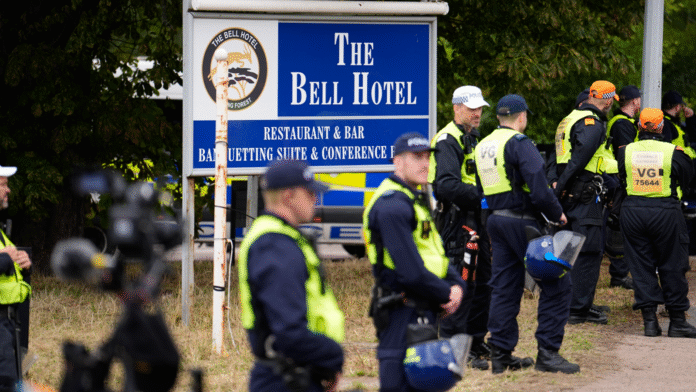A High Court judge ruled that ministers can’t use a hotel to house asylum seekers in Epping on Tuesday. The question now is where else the government can place them.
The ruling, which centred on planning laws and found in favour of the local council, said that The Bell Hotel, in Essex, is not an appropriate place for asylum seekers to live.
The judge, Mr Justice Eyre, has granted Epping Forest District Council a temporary injunction, blocking the hotel from being used to house migrants and requiring all of them to leave by 4pm on 12 September.
Politics latest: Council plan legal challenges to migrant hotels
But the ruling has much larger ramifications than just this one site, with other councils now stating publicly that they hope to follow suit in challenging the use of hotels in court.
That will leave ministers asking where else they might be able to house asylum seekers, especially if judges order multiple hotels to close.
Hotels
It’s worth addressing just how many asylum seekers are currently in hotels.
The latest figures from the Home Office show there were 32,345 asylum seekers in hotels in the UK at the end of March, down 15% from the end of December.
At its peak, there were 56,042 asylum seekers being housed in hotels at the end of September 2023.
According to the National Audit Office (NAO), those in hotels make up around 35% of all people in asylum accommodation, with a report in April stating the government is now housing around 110,000 people as of December 2024.
Hotels are also disproportionately expensive. While those in hotels made up just 35%, they also made up around 76% of the costs of Home Office contracts for accommodation.
But the number of hotels housing asylum seekers is down, with the government pledging to end the use of hotels entirely by 2029.
The number in use has already fallen from a high of more than 400 in the summer of 2023, to fewer than 210 now.
Houses and flats
The most obvious alternative to housing asylum seekers in hotels is to place them in ordinary flats and houses.
This could include properties rented from private landlords and others from social housing providers. According to the NAO, around 66,000 people were being housed in flats and houses by the end of December 2024, which the Home Office calls ‘dispersed accommodation’.
By contrast, there were around 38,000 people in hotels during the same period.
The problem with moving more asylum seekers into houses and flats is that this will put added pressure on already high rents in the private sector, and lead to angry accusations that migrants are being given homes ahead of UK citizens, also on council waiting lists for accommodation.
One recent example is the plan to house 35 people in flats above shops in Waterlooville in Hampshire.
The local MP, former home secretary Suella Braverman, campaigned against the proposals and clashed with the leader of the local council over them. But the government has since announced it is not going ahead with the plans.
Military bases or camps
Another place asylum seekers could be housed is in former military bases or in specially-constructed camps.
Senior Reform UK politician Zia Yusuf suggested to Sky News on Wednesday that migrants should be housed in “modular accommodation at military bases”. Meanwhile, Conservative leader Kemi Badenoch called on the government to “build proper camps where we keep people safe” last week. She likened these camps to the pop-up Nightingale hospitals erected at short notice during the Coronavirus pandemic.
The problem is that military bases have been tried before – and largely discontinued, due to a lack of success.
In 2022, the then-Conservative government announced plans to use ex-military facilities to house asylum seekers.
Some asylum seekers have been housed at sites such as Wethersfield Airfield in Essex and at the former Napier barracks in Folkestone, Kent. Plans to use a former RAF base at Scampton were scrapped by the Labour government in September 2024.
But the Home Office has since ruled out plans to use “large sites other than Wethersfield” because of high costs and a recognition that “accommodating large numbers of people near small communities is difficult to manage”, according to the NAO report published this April.
The previous Conservative government also tried using alternative forms of accommodation, introducing the Bibby Stockholm barge and refitting it to house migrants, before mooring it off Portland, in Dorset.
But safety concerns, protests and high costs saw the use of the barge discontinued in November 2024 by the Labour government. The NAO said the barge, which could house 400 men a night, cost the taxpayer at least £34.8m.
While the government has previously stated its intention not to use large sites going forward, this may have to change if the courts make housing asylum seekers in hotels unviable.
The NAO points out that the Home Office spent £15.4 million buying the Northeye site in Bexhill, East Sussex in September 2023. This was never used as it was deemed unsuitable, and the government was originally looking at transferring or selling the site. Similarly, the Home Office also had a contract to refit former student accommodation in Huddersfield for asylum seekers, and these could now be seen as an option.












